Photo: Paul Morigi via Getty Images
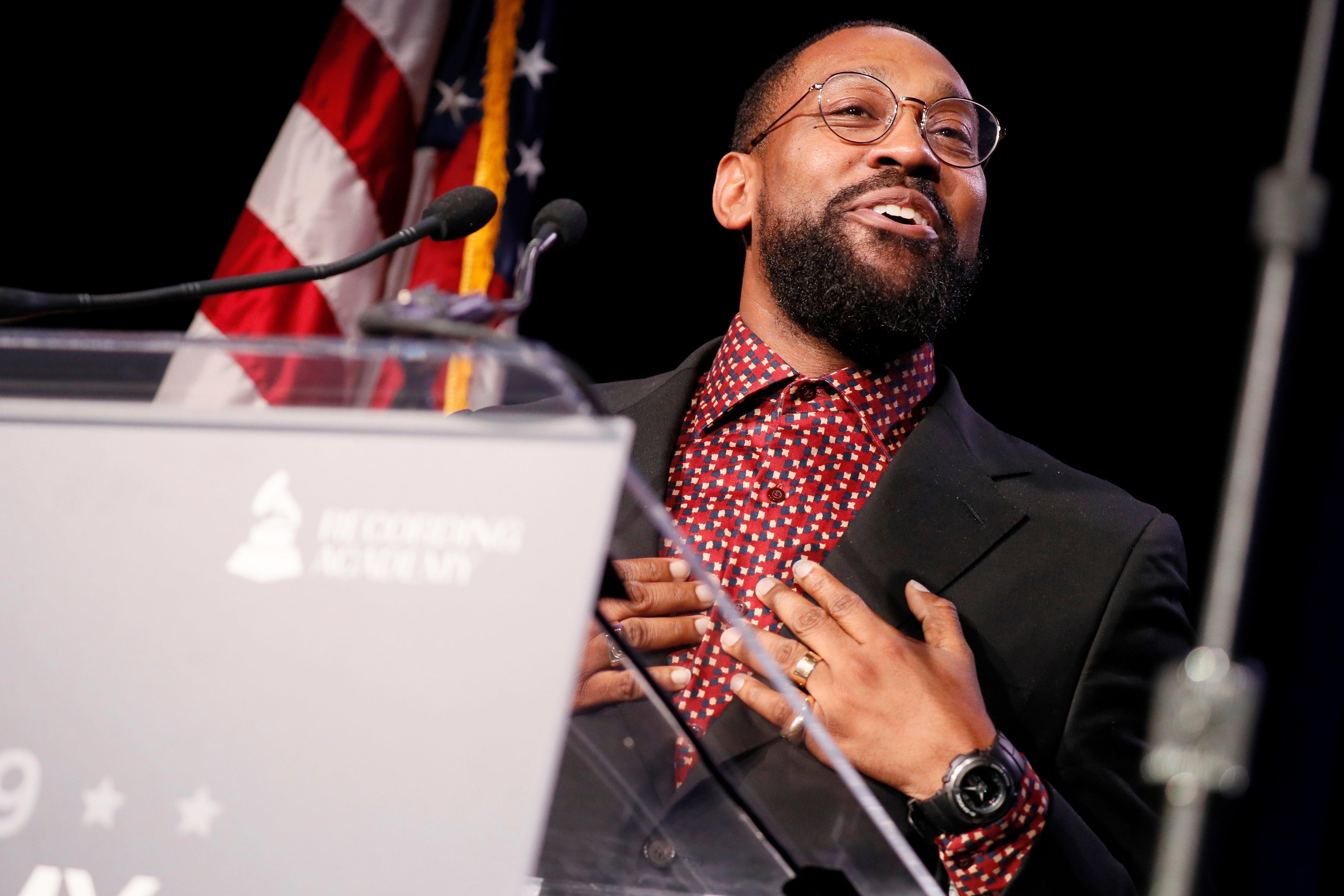
list
10 GRAMMY Nominees Who Advocate For Music People's Rights
Meet 10 GRAMMY nominees who have gotten involved with Recording Academy Advocacy.
The Recording Academy may be most visible for the GRAMMYs, but handing out awards is hardly all it does.
Rather, the world's leading society of music professionals works to change the music landscape for the better — and from a legislative standpoint, that channel is Advocacy.
There's significant overlap, too, between the artists you might see on TV and those who champion the rights of music people.
Read on for 10 GRAMMY nominees who have gotten involved with Recording Academy Advocacy — and consider how you, too, can get involved in this crucial process.
John Legend
As a singer/songwriter, John Legend may be busy enough to earn 12 career GRAMMYs. But that doesn't mean he hasn't made time to fight for music creators' rights.
In 2020, Legend participated in Recording Academy Advocacy's District Advocate Day,where he met virtually with the Chair of the House Democratic Caucus, Rep. Hakeem Jeffries (D-N.Y.), to discuss the importance of including music creators in COVID-19 relief funding. He also serves on the Recording Academy's National Board of Trustees.
This year, he is nominated for GRAMMYs Best Rap Performance and Best Rap Song for his work on God Did by DJ Khaled, which also features Rick Ross, Lil Wayne, Jay-Z, John Legend, Fridayy, and other leading lights.
Sean Paul
In April 2022, GRAMMY winner Sean Paul came to Washington, D.C. to be part of the first GRAMMYs On The Hill Advocacy Day in three years.
While in town, he met with multiple Congressional offices, including those of Senator Marsha Blackburn (R-TN) and Rep. Jimmy Gomez (D-CA), to advocate for the passage of pro-music legislation such as the HITS Act and the PEACE Through Music Diplomacy Act.
Sean Paul's album, Scorcha, is nominated for a GRAMMY for Best Reggae Album at the 2023 GRAMMYs — his 10th career nomination in all.

*Rep. Hakeem Jeffries and John Legend. Photo courtesy of the Recording Academy.*
PJ Morton
PJ Morton is not only a four-time GRAMMY-winning artist; he'salso a consistent advocate for the music community.
In 2020, Morton met virtually with House Minority Whip Steve Scalise (R-LA) to urge Congress to pass legislation that would help creators financially recover from the pandemic.
Additionally, displayed his championhood for creator's rights when he met with Members of the House and Senate in 2019 during the Recording Academy's GRAMMYs On The Hill Advocacy Day and in his home state during the 2017 Louisianna Advocacy Day. PJ Morton is also a member of the Recording Academy's National Board of Trustees.
This year, Morton is nominated for GRAMMYs for Best R&B Song ("Please Don't Walk Away"), Best R&B Album (Watch the Sun), and Best Gospel Performance/Song ("The Better Benediction").

Liz Rose
Two-time GRAMMY winner Liz Rose, is nominated for a GRAMMY for Song Of The Year for co-writing "All Too Well (10 Minute Version)" alongside Taylor Swift. This marks her sixth nomination ever.
In addition to being an accomplished songwriter, Rose has also been an advocate for the rights of creators. In 2018, she came to Washington to participate in the Recording Academy's annual GRAMMYs On The Hill Awards.
There, she paid tribute to honorees Little Big Town alongside fellow songwriters Lori McKenna and Hillary Lindsey — collectively known as the Love Junkies. She also lobbied for creators on Capitol Hill as part of GRAMMYs On The Hill Advocacy Day.
Brandi Carlile
In 2020, six-time GRAMMY winner Brandi Carlile was a special guest at the annual GRAMMY Fund Brunch, benefiting the GRAMMY Fund for Music Creators.
This fundraiser is crucial to the Recording Academy's Advocacy work by allowing the Academy to support Members of Congress who actively champion music creators within their legislation.
Carlile has been nominated for seven golden gramophones at the 2023 GRAMMYs — for Record Of The Year, Album Of The Year, Best Rock Performance, Best Rock Song, Best Americana Performance, Best American Roots Song, and Best Americana Album.
J. Ivy
At the 2023 GRAMMYs, J. Ivy's The Poet Who Sat by the Door is nominated for a GRAMMY for Best Spoken Word Poetry Album — marking the second GRAMMY nomination of his career.
Ivy also participates in the Recording Academy Advocacy's annual District Advocate Day. Through the years, he's met with lawmakers in his state like Sen. Richard Durbin (D-IL) and Rep. Robin Kelly (D-IL) to make sure his representatives keep music creators in mind when crafting legislation.

*Shaggy and Sting with Daryl Friedman. Photo: Rebecca Sapp via Getty Images*
Shaggy
Two-time GRAMMY-winning artist Shaggy has also been a supporter for music creator's rights.
In 2018, Shaggy and frequent collaborator Sting participated in a moderated discussion at the GRAMMY Museum to discuss important pieces of legislation such as the Music Modernization Act — which became law just days later.
At the 2023 GRAMMYs, Shaggy Com Fly Wid Mi is nominated for a GRAMMY for Best Reggae Album.
Fantastic Negrito
Back in 2018, Fantastic Negrito took his talents to Washington, D.C. for the Recording Academy's GRAMMYs On The Hill Advocacy Day.
Therein, he met with Members of Congress and their staff to discuss the importance of passing the Music Modernization Act (MMA) — which went on to become law just months later.
Fantastic Negrito's song "Oh Betty" is nominated for Best American Roots Performance at the 2023 GRAMMYs; previously, he's won three GRAMMYs for Best Contemporary Blues Album.
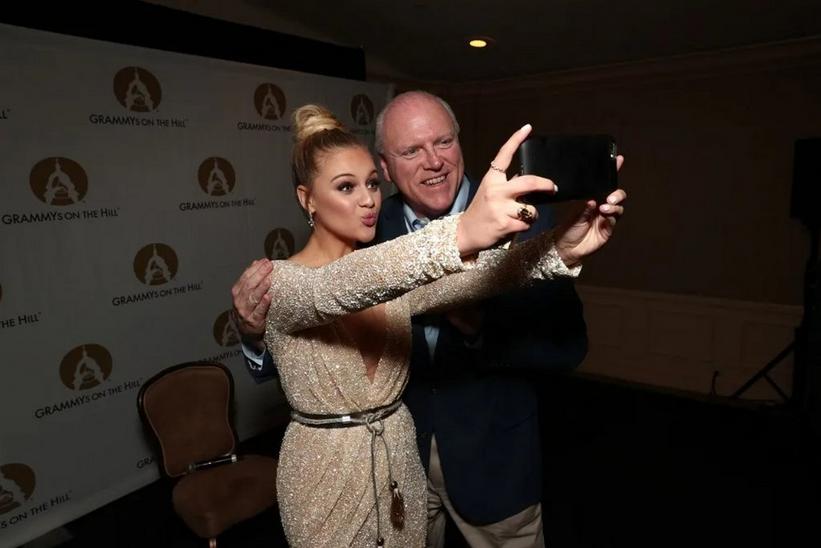
*Former Rep. Joe Crowley and Kelsea Ballerini. Photo: Mark Sullivan/WireImage*
Kelsea Ballerini
In 2017, Bellerini participated in a GRAMMY Week Congressional Briefing hosted by the Recording Academy's Advocacy Department. During the briefing, Members of Congress had the opportunity to hear directly from music creators — such as Ballerini herself — on why passing pro-music legislation is so important.
This year, Ballerini is up for her third GRAMMY nomination for her song "Heartfirst," in the Best Country Solo Performance category.

*Tayla Parx. Photo: David Becker via Getty Images*
Tayla Parx
Not only did Parx participate in a Recording Academy webinar on mechanical licensing where she helped explain to artists how the service would benefit them; she participated in the 2022 GRAMMY Week Congressional Briefing.
As members of Congress and their staff looked on, Parx joined fellow women songwriters to discuss their experience as females in the industry, how COVID-19 impacted them, and what Congress can do to help.
This year, Parx is nominated for a GRAMMY for Best Contemporary Instrumental Album for her work on DOMi & JD Beck's NOT TIGHT. She is also nominated for a GRAMMY for Best Traditional Pop Vocal Album for her work on Diana Ross's album Thank You.
District Advocate Day 2022 Is A Wrap. What Was Accomplished, And How Do We Move Forward?

Photo: The Chosunilbo JNS/Imazins via Getty Images
list
New Music Friday: Listen To New Songs From LISA From Blackpink, Lil Nas X, Kelsea Ballerini, MC Lyte & More
Hot summer days require even hotter tunes. Here are some fresh-out-the-oven songs and albums by Hiatus Kaiyote, Lucky Daye, Headie One, Kaitlin Butts, and more.
We’ve been feeling the heat for a minute now, but summer is finally, officially, upon us.
What do you have on deck to soundtrack it? Perhaps you’re checking out Camila Cabello’s fourth offering, C,XOXO. Or Jxdn’s expectations-bucking new album, When the Music Stops. And there are so many other worthy candidates for your playlist — from Lupe Fiasco’s Samurai to Omar Apollo’s God Said No.
No matter where your stylistic compass points, this Friday release day has got something for you. As you gather your sunscreen and shades, let’s breeze through a cross-section of what’s out there.
LISA — "Rockstar"
K-pop loves its solo releases, showcasing how the various members of a group can shine individually while combining with ecstatic chemistry. Enter LISA, one-fourth of Korean titans BLACKPINK, who's already turned heads with her 2021 debut album, Lalisa.
"Rockstar" is another swing outside her main gig, featuring serrated chiptune production and LISA's commanding rap flow. The gritty, urban, futuristic video is a visual treat, and the chorus's boast of "Lisa, can you teach me Japanese?" is a multilingual flex — as well as a maddeningly unshakeable earworm.
Kelsea Ballerini & Noah Kahan — "Cowboys Cry Too"
The "Peter Pan" heavyweight and four-time GRAMMY nominee Kelsea Ballerini has called 2024 "a new chapter of music." Her collaboration with folk/pop singer/songwriter Noah Kahan, "Cowboys Cry Too," is the tip of the spear.
More than a month after the pair performed together at the 2024 Academy of Country Music Awards, their first recorded team-up is an aching, yearning ballad about breaking down a gruff exterior and revealing true emotions.
"Cowboys cry too/ They may not let 'em fall down in their hometown thinkin' they still got s*** to prove," Ballerini sings in the chorus. "That well runs deep/ But when he's showin' his skin, lettin' mе in, that's when he's toughest to mе."
Lil Nas X — "Here We Go!" (from the Netflix film 'Beverly Hills Cop: Axel F')
"So excited to release the best song of all time this friday!," Lil Nas X proclaimed on Instagram. (And on a Beverly Hills Cop soundtrack, no less!)
"Here We Go!" comes at an inflection point for the "J Christ" singer: "sorry I've been so scared with my art lately," he added in the same post. "I'm coming around to myself again. I will make you guys very proud."
This pro forma banger certainly inspires pride: tenacious lines like "I'm livin' and livin' I wanna die/ They tryna get even/ I'm beatin' the odds" will get under your skin. As for Beverly Hill Cop: Axel F, the Eddie Murphy joint will whiz to your screen July 3 via Netflix.
Lucky Daye — 'Algorithm'
Lucky Daye picked up a win for Best Progressive Album at the 2022 GRAMMYs, for Table for Two. After a slew of nominations for work with Beyoncé and Mary J. Blige, he's investigating the Algorithm.
The single "HERicane" was just a teaser, with songs like "Blame," featuring Teddy Swims; "Paralyzed," featuring RAYE;" and "Diamonds in Teal" expanding on and honing his soul-funk-R&B vision.
"Don't know pickin' sides/ 'Cause I'm rollin' in desire," he dreamily sings in the gently roiling "Diamonds in Teal." "I don't know which lie's true/ Or maybe I do, or maybe I'm you." It's a suitable mission statement wrapped in a stealthily seductive package.
Hiatus Kaiyote — 'Love Heart Cheat Code'
A jazzy, soulful, psychedelic band of Aussies, Hiatus Kaiyote has been wowing audiences for more than a decade. Whether through sampling or features, they've crossed paths with Drake, Anderson .Paak, and Beyoncé and Jay-Z.
Love Heart Cheat Code builds brilliantly on their last three albums: their 2012 debut Tawk Tomahawk, 2015's Choose Your Weapon, and 2021's Mood Valiant. Tracks like "Telescope," "Everything's Beautiful," and "Make Friends" are burbling brooks of atmosphere, groove and vibe.
Boulevards — 'Carolina Funk: Barn Burner on Tobacco Road'
Any fans of deep, pungent funk grooves should investigate Boulevards immediately. The project of mastermind Jamil Rashad, their new album Carolina Funk: Barn Burner on Tobacco Road tips its hat to yesterday's funk with a contemporary twist, bringing a refreshing spin on the well-trod template of syncopated basslines and stabbing horns.
Across highlights like "Do It Like a Maniac Part 1&2" and "Run & Move," Boulevards shows — once again — that few can nail this gritty sound quite like Rashad and crew.
Headie One — 'The Last One'
British drill-inflected MC Headie One first made a splash overseas with his 2023 debut album, Strength to Strength. Less than a year later, he's returning with The Last One.
Back in 2022, he hinted at the existence of his sophomore album in his non-album track "50s" — "The fans calling for 'Martin's Sofa'/ It might be the first single from my second," he rapped.
Helmed by that single, The Last One features Potter Payper, Stormzy, Fridayy, Skrillex, and more. The album is a leap forward in terms of production, scale and exploration.
Katlin Butts — 'Roadrunner!'
Any theater kid worth their salt knows at least a few bars from the musical "Oklahoma!"; country sensation Kaitlyn Butts has just unfolded it into an entire album.
"It's a love story but there's also a murder and a little bit of an acid-trippy feel to it at times; it's set in the same place where I come from," she said in a statement, noting she saw "Oklahoma!" with her parents every summer during childhood. "Once I got the idea for this album," she continued, "I couldn't believe I hadn't thought of it before, and it turned into something that completely encompasses who I am and what I love."
A laugh riot as well as a colorful, openhearted statement, Roadrunner! does the old Rodgers and Hammerstein chestnut good.
Read more: 5 Female Artists Creating The Future Of Country Music: Jaime Wyatt, Miko Marks & More
Amaarae — 'roses are red, tears are blue — Fountain Baby Extended Play'
Futurist Afropopper Amaarae made a gigantic splash with her second album, 2023's Fountain Baby — even Pitchfork gave it their coveted Best New Music designation.
That lush, enveloping album just got an expansion pack: roses are red, tears are blue — A Fountain Baby Extended Play is a continuation of its predecessor with six new songs. The oceanic "wanted," featuring Naomi Sharon, is a highlight, as is a remix of "Disguise" with 6LACK.
"Ooh, I'll be wanted/ I've been wanted," a pitch-shifted Sharon sings near the end, as if turning over the phrase. "Wanted" is one way to describe Amaraae's position in the music landscape.
Learn more: Meet The Latest Wave Of Rising Afrobeats Stars: AMAARAE, BNXN, Oladapo & More
MC Lyte — "King King" (feat. Queen Latifah)
The 50th anniversary of hip-hop may have come and gone, but hip-hop is forever. Today, legendary hip-hop pioneers MC Lyte and Queen Latifah continue to bear the flame of the genre as an elevating force with "King King," a conscious, uplifting offering.
"This is dedicated to all the kings and all the soon to be kings/ We're counting on you/ We love you/ This is for you, you and you and you," MC Lyte begins, while Latifah holds it down on the chorus with "This your crown hold it/ Even if it all falls down show it/ You know the world is watching now I know you get tired from keepin' it all together/ We need you."
During Women's History Month in March, MC Lyte released "Woman," the first single from her upcoming album, featuring hip-hop icons Salt (of Salt 'N Pepa), Big Daddy Kane, and R&B singer Raheem DeVaughn. MC Lyte's first new album in nearly a decade drops this summer; keep your eyes and ears peeled.
Learn more: 9 Teen Girls Who Built Hip-Hop: Roxanne Shante, J.J. Fadd, Angie Martinez & More
Latest News & Exclusive Videos
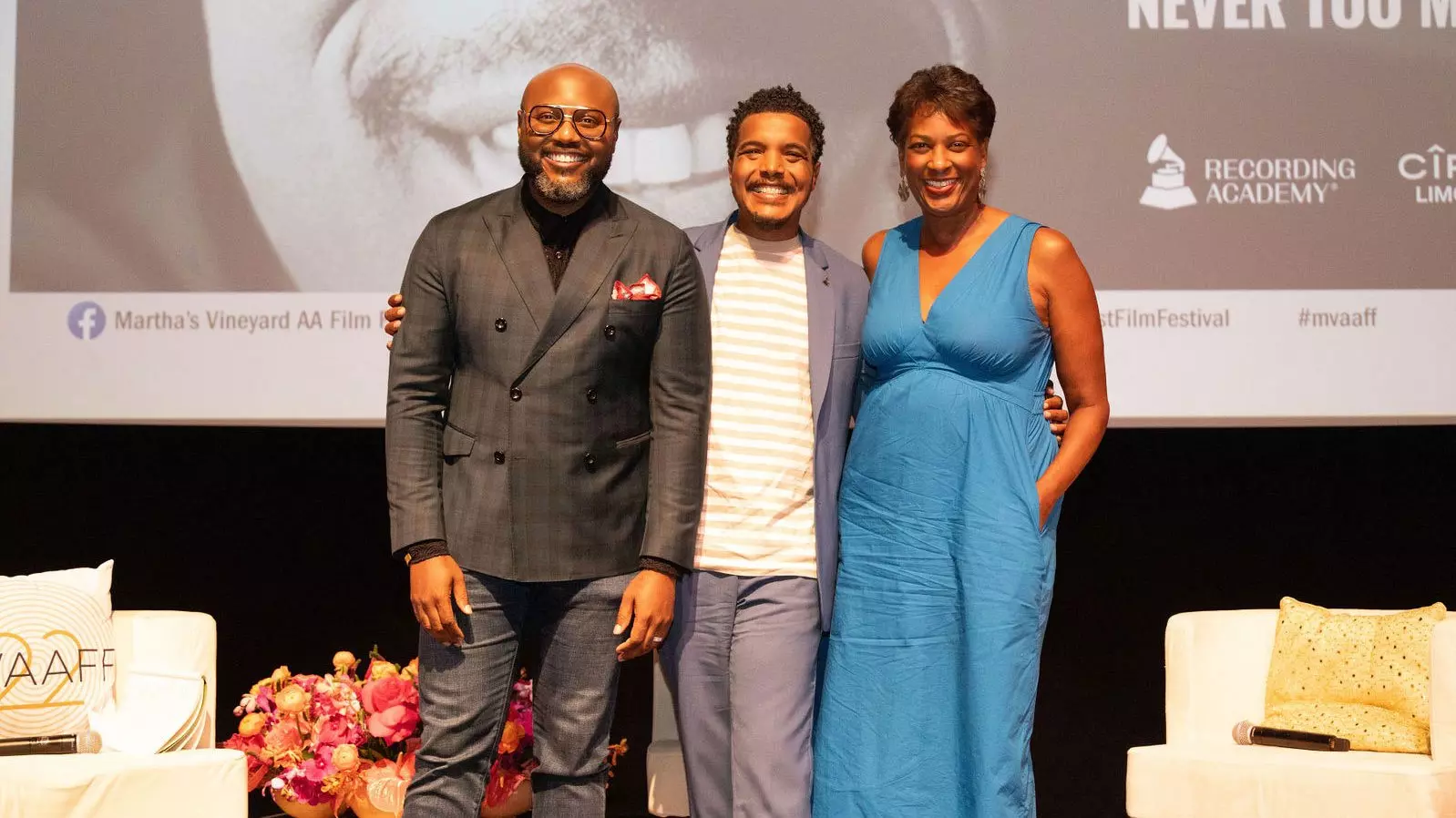
How The Film 'Luther: Never Too Much' Elevates The Legacy Of R&B Icon Luther Vandross

Watch Tommy Brain Share His Akai MPC
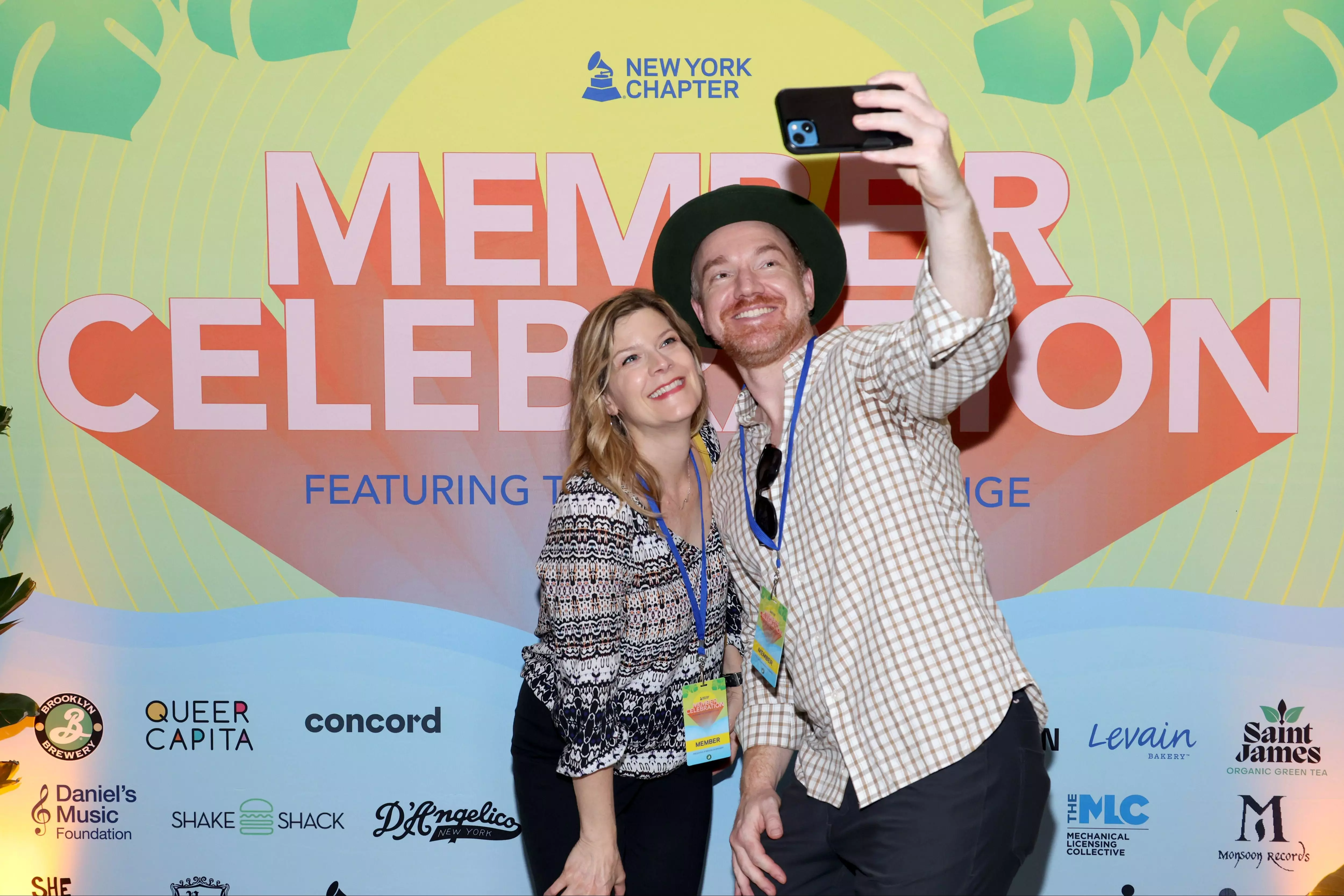
At Their Member Celebration, The Recording Academy's New York Chapter Sees A Joyous Meeting Of The Musical Minds
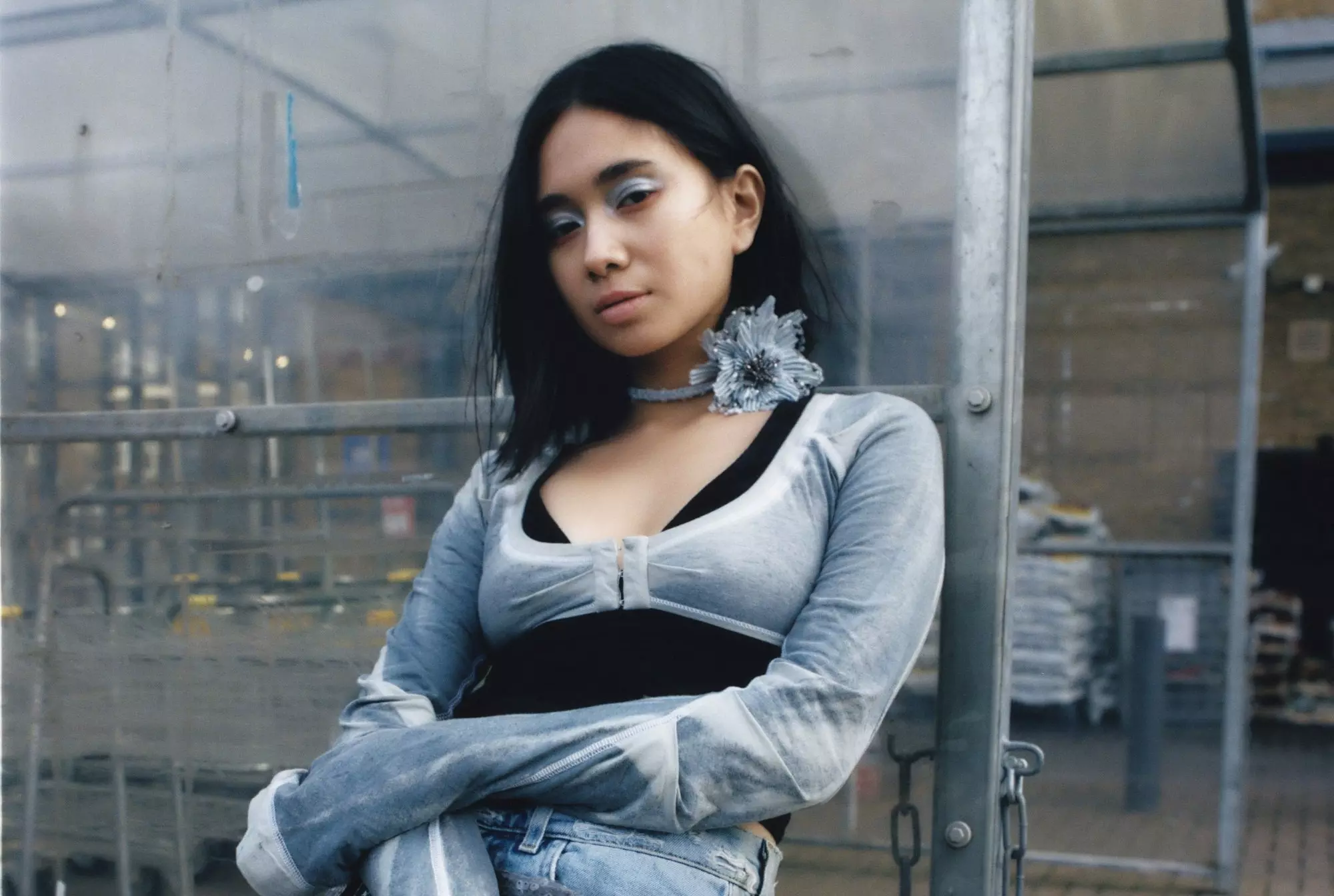
On Her New Album 'Buzz,' NIKI Embraces Radical Acceptance & The Art Of Letting Go
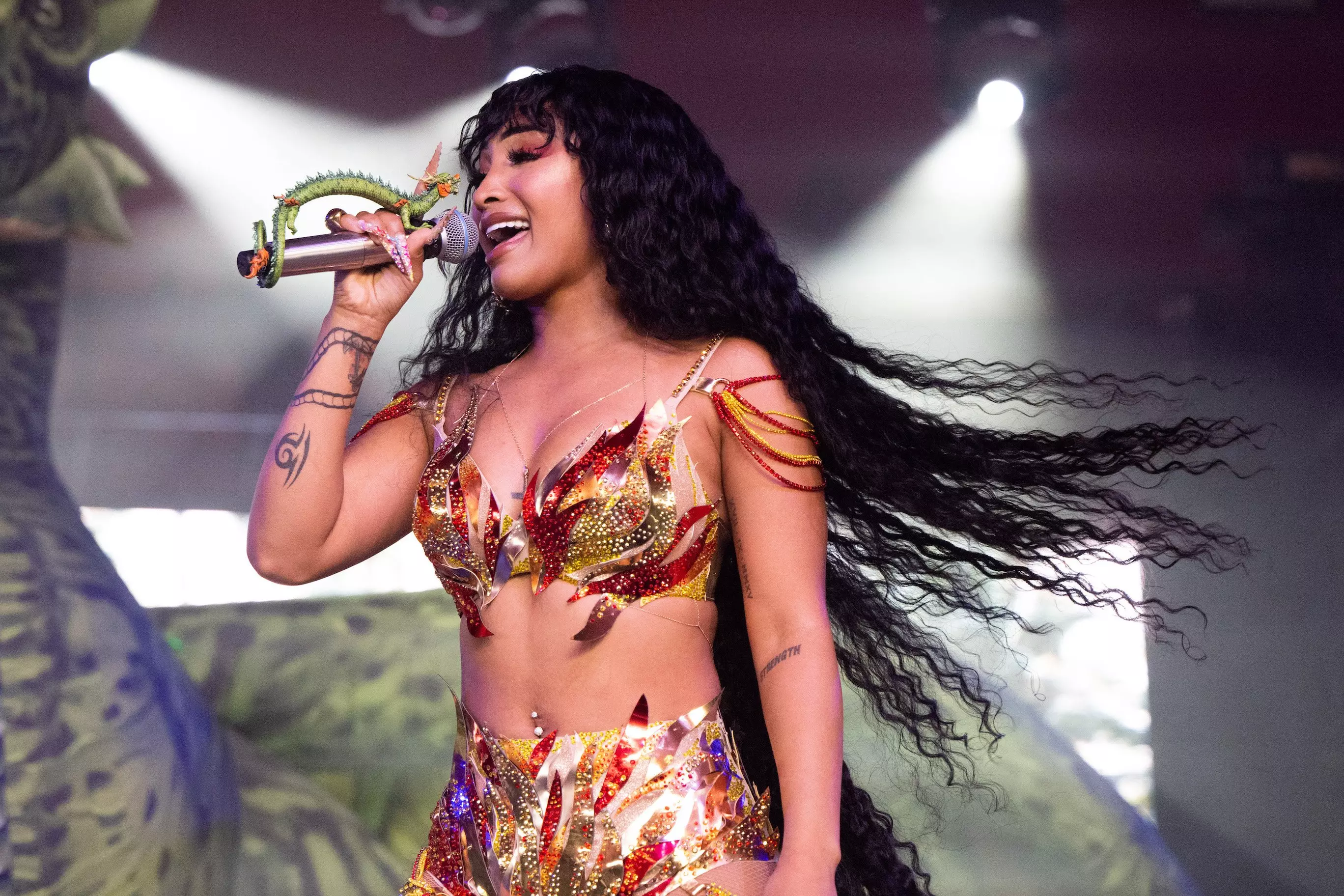
8 Can't-Miss Acts At Afro Nation Detroit 2024: Shenseea, Ayra Starr, Kizz Daniel & More
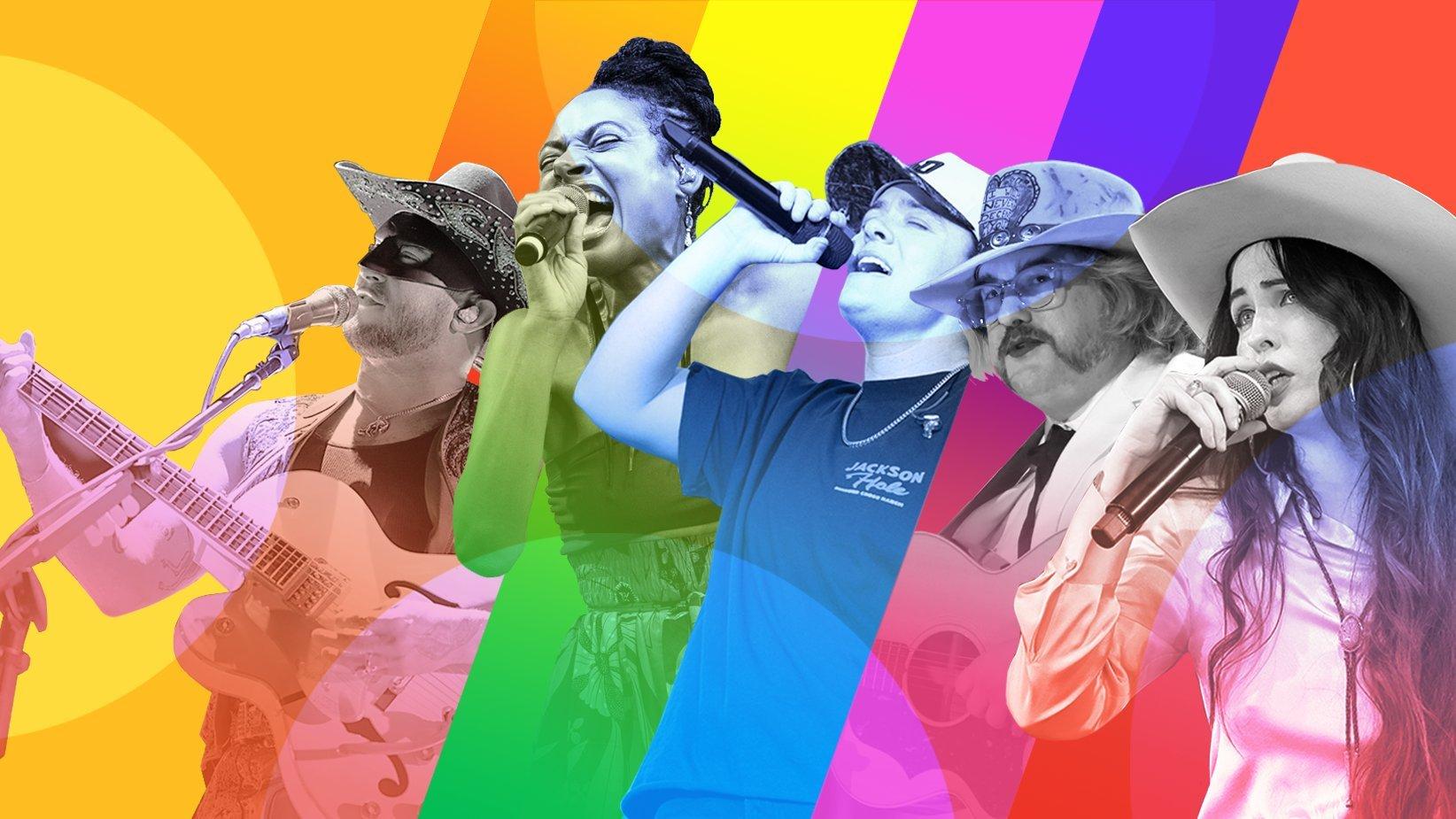
Photos (L-R): Jeff Hahne/Getty Images, Erika Goldring/Getty Images, Erika Goldring/Getty Images, Jason Kempin/Getty Images for Americana Music Association, Frazer Harrison/Getty Images for Stagecoach
feature
How Queer Country Artists Are Creating Space For Inclusive Stories In The Genre
As country music continues its global explosion, the genre is seeing a growing number of artists in the LGBTQIA+ community — including Adeem the Artist, Lily Rose and Jaime Wyatt — blaze a trail toward acceptance.
When country singer/songwriter Jaime Wyatt announced she was queer with the release of her second album, 2020's Neon Cross, she was convinced doing so would destroy her career. Instead, something shifted — not only was she more free to be herself and to date women openly, but many fans reacted positively, too.
"Several times on the road I've had fans come up to me with their same sex partner, and they're like, 'Hey, we feel safe here. It's so awesome because we both love country music, and we're not out of the closet, and we're not out to our families, but we can be here,'" Wyatt says.
Modern country music is generally perceived as a conservative genre, and deep-rooted cultural and industry biases have long excluded LGBTQIA+ (and BIPOC) artists and stories from the genre. For example, in 2010, when successful mainstream country artist Chely Wright came out, her career stalled and record sales halved. Kacey Musgraves was criticized for lyrics supporting same-sex love in her beloved anthem, "Follow Your Arrow." More recently, even, Wyatt walked out of a recording session after the owner of the space asked if she was singing "'some gay s—.'"
But Wyatt is also one of a growing number of country artists who, in recent years, have blazed a trail through country music and toward acceptance. Among them, Adeem the Artist, Mya Byrne, Brandi Carlile, Brandy Clark, Mary Gauthier, Lizzy No, Orville Peck, Lily Rose, and Allison Russell. Together, they're celebrating queerness alongside their love for the genre, and pushing it into diversity with patience, tenacity, and darn good country music.
"If you listen to popular music, or if you listen to hip-hop music, it feels like there's a broader diversity to a lot of subcultures as far as what you're able to access," nonbinary country singer/songwriter Adeem the Artist says. "Whereas with country music, it's very linear, it's very myopic, and singular in its expression."
By way of broadening country's storytelling, Adeem plays a honky-tonk blend of classic and '90s country music that's sonically aligned with the deep musical traditions in Tennessee, where they now live. Lyrically, though, their propensity for gorgeous, frankly worded songs complicate stereotypical southern narratives in rare and provocative ways. On White Trash Revelry, their 2022 studio album, they grapple with racism, economic entrapment, gun violence, and family heritage. And their latest, Anniversary, released in May, includes songs about mental health, the poignance of parenthood, and the pain and fear of being a queer person in a world that threatens their existence.
Indeed, some of the places in the U.S. with the strongest ties to country music remain the least hospitable to queer people. Just last year, Tennessee, home of Nashville, the country music capital of the world, passed a total of 10 bills aimed at LGBTQIA+ people, while Texas, perhaps country music's second-best known state, passed 20 percent of all anti-LGBTQIA+ legislation in the U.S. What's more, LGBTQIA+ people and culture have been targeted by numerous attacks around the world — including the Pulse nightclub and Club Q shootings stateside — in the last few years alone.
For many, the consequences of not coming out, of not sharing their full selves with the world, are risky, too. Growing up, Wyatt had no role model to show her it was okay to be queer. She struggled for years with mental health and substance abuse and was convicted of robbing her heroin dealer as a young adult. "I needed to see someone who looked like me when I was a young child," Wyatt says. "And maybe I wouldn't have been a dope fiend in jail."
But while straight white men comprise most of country music's standard slate of forebearers, women and people in the BIPOC and LGBTQIA+ communities have contributed to the genre since its beginning. Notably, it was Sister Rosetta Tharpe, a queer Black woman, who in the 1950s introduced reverb to gospel and rhythm and blues music — and in doing so, she forever changed guitar playing, and inspired some of country music's biggest trailblazers, from Elvis to Johnny Cash.
In 1973 — four years after the Stonewall uprising kickstarted a widespread gay liberation movement — Patrick Haggerty and his band Lavender Country released what is generally considered the first gay country album. But after it sold out its first pressing of 1000 copies, the album was mostly forgotten until 1999, when the Journal of Country Music published an article hailing Haggerty as "the lost pioneer of out gay country music." Haggerty began performing again and in 2014, indie label Paradise of Bachelors reissued the Lavender Country album, securing Haggerty status as a grandfather figure to queer country.
Haggerty's reissue landed in a different world than the album's original run. In the interim, a handful of artists released more queer country music, including Jeff Miller, aka "John Deere Diva," known for his George Strait parody, "Not Really Strait," as well as Doug Stevens and the Outband's When Love Is Right and Sid Spencer's Out-N-About Again, which put lyrically gay songs to country music.
In 2011, shortly before the Lavender Country reissue, queer country singer/songwriter and music scholar Karen Pittleman convened the first Gay Ole Opry in Brooklyn's now defunct Public Assembly performance space, launching more than a decade of queer country events, tours and a far-reaching network of performers and supporters. And in 2015, gay marriage became legal nationwide.
As progress has accelerated culturally in the near decade since, it has in country music, too. In 2018, Paisley Fields' debut album Glitter and Sawdust merged cowboy grit with queer raunch. In 2019, Lil Nas X's "Old Town Road" provoked country music to re-consider the nature and identity of country music. In 2021, T.J. Osborne of the Brothers Osborne became the first openly gay male artist signed to a major record label; a year later, the duo's song "Younger Me" — which was written in response to T.J.'s coming out — became the first country song with an LGBTQIA+ theme to win a GRAMMY. And this Pride Month, longtime LGBTQIA+ supporter (and GLAAD's 2023 Excellence in Media Award recipient) Maren Morris declared on Instagram, "happy to be the B in LGBTQ+."
"We as queer fans deserve to have songs that speaks specifically to us," says Rachel Cholst, a queer writer and educator. "And if that means putting in same gender pronouns, then we deserve that too. And if that makes a straight person uncomfortable, I don't know what to tell you. I've grown up my entire life having to internally change the pronouns to the love songs that really moved me."
Cholst started writing about music when she realized she couldn't be the only queer country fan out there. Her work aims to make queer country music accessible, and she has run the Adobe and Teardrops blog for more than a decade. In 2022, Cholst launched Rainbow Rodeo, a zine about queer country music, which appears bi-annually in print and regularly online.
"Everyone just assumed that country music is this one thing, and it never occurred to them to go look for it. That tells you a lot about how country music wants to present itself as an industry," Cholst says. "If we erase anyone who's not straight, anyone who's not white, then what you're saying is, you want those people to be erased from the conversation, from the culture."
Beyond using she/her pronouns in love songs (which she didn't get to do on her first album, Felony Blues), Wyatt's powerful, steely queer country music complicates social consciousness. Incisive and elegant in her delivery, she's equally compelling chronicling her conviction and jail time on Felony Blues, confronting demons and figuring out who she is on her Shooter Jennings-produced second album, Neon Cross, and outlining her hopes and frustrations for the world on her third album, 2023's sultry, groovy, Feel Good.
Wyatt's knack for catchy and advocacy-laced country bangers is clearest in "Rattlesnake Girl," one of her most popular songs. In it, she offers an anthemic celebration of joy unfettered: "I see my sweet friends out on the weekend/ They all look happy and gay," and a barbed warning to anyone who might impinge on that happiness: "Thank you kindly, don't walk behind me/ I've seen people slip that way/ And if you try me, boot heels beside me/ I might have to make your day."
Queer country music means something a little different to each artist. For many, it's about much more than simply being a queer person performing country music. Adeem the Artist considers queer country its own genre, complete with specific rules — many of which have nothing to do with sexual or gender orientation.
"It is explicitly political in nature. It is often kind of raunchy," they assert. "There's an element to queer country that is confrontational, that is willing to create discomfort for the sake of a relief that leans towards some greater social awareness."
To some degree, raising awareness and representation — which is essential for inclusion and acceptance — requires a bit of self-tokenization, Adeem says. "The very, very basic act of referring to me as a person who is queer, who is trans, who is nonbinary, who is whatever, those labels only do good as much as they illuminate the differences between us and the fact that I am more difficult for some people to relate with."
Adeem and Wyatt both operate within the alt-country scene, which has been marginally more inclusive than mainstream country over the years. Recently, though, rising country musician Lily Rose cracked through with her viral breakup single, 2020's "Villain." On her latest EP, Runnin' Outta Time (which she released in May), she sings a high-octane pop/country mix about her values and relationships. It's a well-worn country music landscape that has been almost exclusively dominated by heterosexual white men.
"To be one of the first to literally [and] figuratively, carry the flag... it makes me really proud. And it has its heavy moments for sure," Rose says. "Night after night, when I get to meet fans and see comments on social media that they feel seen for the first time in the genre, it's really special and it makes every single second of hard work to get here worth it."
The day after Runnin' Out of Time dropped, Rose made her Grand Ole Opry debut with two songs from the album, "Back Pew" and "Two Flowers"; Adeem and Wyatt also played the Opry for the first time in the last year as well. The Opry, one of country music's oldest and most lauded tastemakers, has welcomed a number of queer artists in the last few years, signaling a subtle shift toward a more inclusive country music institution. (In addition, all three artists recently scored high-profile touring spots: Rose with Shania Twain and Sam Hunt, Adeem with Tyler Childers and Jason Isbell and the 400 Unit; and Wyatt wrapped up her first headlining tour.)
For Pittleman, an essential part of making music is ensuring space for anyone who wants to make music to do so, regardless of how they look or identify. "Most people who like country music, they just want to hear country music," Pittleman says. "I want to have a good time, too. But you have to ask at a certain point, 'Who is invited to the good time?'"
As she insists, there's a long way to go. In a digital world, radio play doesn't offer a complete picture, but it remains a dominant force in country music. For decades, women have been played sparingly on country radio and artists of color and queer musicians featured far less, a shortcoming which SongData's principal investigator, Jada Watson, spent years studying. Her research concludes that women country artists are played roughly 29 percent of the time, Black artists 5 percent, and other artists of color 7 percent. Queer artists, Watson estimates, make up less than 1 percent of radio play.
"The real problem is who's making those decisions; who has the power and as a result, who has the power and the resources to record their music, to distribute their music, to get it out on a broader scale," Pittleman suggests. "We have to make sure that everyone who's called to make the music has the resources and the power to make it and bring it into the world."
And in spite of multitude setbacks and naysayers, queer artists are creating country music. As Pittleman wrote in a 2020 essay in the Journal of Popular Music Studies titled "You're My Country Music," one of the joys of singing queer country music is making country music, plain and simple. "The point is to mark the deepest moments of human connection, our truest hopes and heartbreaks, and turn them into a sound that gives us joy and strength," she says.
"Because sometimes you love a culture that doesn't love you back," Pittleman continues on the Gay Ole Opry's about page. "We do it because we love the music and want to build a community to support queer country musicians. We do it because everybody needs a honky-tonk angel to hold them tight. We do it because we believe in country music for all."
Why 2024 Is The Year Women In Country Music Will Finally Have Their Moment
PRIDE & Black Music Month: Celebrating LGBTQIA+ & Black Voices
Listen To GRAMMY.com's 2024 Pride Month Playlist Of Rising LGBTQIA+ Artists
9 New Pride Anthems For 2024: Sabrina Carpenter's "Espresso," Chappell Roan's "Casual" & More
What's The Future For Black Artists In Country Music? Breland, Reyna Roberts & More Sound Off
Why Beyoncé Is One Of The Most Influential Women In Music History | Run The World
9 Ways To Support Black Musicians & Creators Year-Round
How Beyoncé Is Honoring Black Music History With 'Cowboy Carter,' "Texas Hold Em," 'Renaissance' & More
The Evolution Of The Queer Anthem: From Judy Garland To Lady Gaga & Lil Nas X
15 LGBTQIA+ Artists Performing At 2024 Summer Festivals
50 Artists Who Changed Rap: Jay-Z, The Notorious B.I.G., Dr. Dre, Nicki Minaj, Kendrick Lamar, Eminem & More
Fight The Power: 11 Powerful Protest Songs Advocating For Racial Justice

How Rihanna Uses Her Superstardom To Champion Diversity | Black Sounds Beautiful

How Beyoncé Has Empowered The Black Community Across Her Music And Art | Black Sounds Beautiful
5 Women Essential To Rap: Cardi B, Lil' Kim, MC Lyte, Sylvia Robinson & Tierra Whack
Celebrate 40 Years Of Def Jam With 15 Albums That Show Its Influence & Legacy

Watch Frank Ocean Win Best Urban Contemporary Album At The 2013 GRAMMYs | GRAMMY Rewind
A Brief History Of Black Country Music: 11 Important Tracks From DeFord Bailey, Kane Brown & More
10 Women In African Hip-Hop You Should Know: SGaWD, Nadai Nakai, Sho Madjozi & More
10 Artists Shaping Contemporary Reggae: Samory I, Lila Iké, Iotosh & Others
The Rise Of The Queer Pop Star In The 2010s
How Sam Smith's 'In The Lonely Hour' Became An LGBTQIA+ Trailblazer
How Queer Country Artists Are Creating Space For Inclusive Stories In The Genre

How Jay-Z Became The Blueprint For Hip-Hop Success | Black Sounds Beautiful

How Kendrick Lamar Became A Rap Icon | Black Sounds Beautiful
Dyana Williams On Why Black Music Month Is Not Just A Celebration, But A Call For Respect
6 LGBTQIA+ Latinx Artists You Need To Know: María Becerra, Blue Rojo & More
7 LGBTQ+ Connections In The Beatles' Story
Breaking Down Normani's Journey To 'Dopamine': How Her Debut Album Showcases Resilience & Star Power
10 Alté Artists To Know: Odunsi (The Engine), TeeZee, Lady Donli & More

Celebrating Black Fashion At The GRAMMYs Throughout The Decades | Black Music Month
FLETCHER Is "F—ing Unhinged" & Proud Of It On 'In Search Of The Antidote'
For Laura Jane Grace, Record Cycles Can Be A 'Hole In My Head' — And She's OK With That
15 Essential Afrorock Songs: From The Funkees To Mdou Moctar
50 Years In, "The Wiz" Remains An Inspiration: How A New Recording Repaves The Yellow Brick Road
Why Macklemore & Ryan Lewis' "Same Love" Was One Of The 2010s' Most Important LGBTQ+ Anthems — And How It's Still Impactful 10 Years On
Songbook: The Complete Guide To The Albums, Visuals & Performances That Made Beyoncé A Cultural Force

Why Cardi B Is A Beacon Of Black Excellence | Black Sounds Beautiful
Queer Christian Artists Keep The Faith: How LGBTQ+ Musicians Are Redefining Praise Music
9 Revolutionary Rap Albums To Know: From Kendrick Lamar, Black Star, EarthGang & More
9 "RuPaul's Drag Race" Queens With Musical Second Acts: From Shea Couleé To Trixie Mattel & Willam
5 Black Artists Rewriting Country Music: Mickey Guyton, Kane Brown, Jimmie Allen, Brittney Spencer & Willie Jones
How 1994 Changed The Game For Hip-Hop

How Whitney Houston’s Groundbreaking Legacy Has Endured | Black Sounds Beautiful
LGBTQIA+-Owned Venues To Support Now

Celebrate The Genius Of Prince | Black Sounds Beautiful

Explore The Colorful, Inclusive World Of Sylvester's 'Step II' | For The Record
Black-Owned Music Venues To Support Now
5 Artists Fighting For Social Justice Today: Megan Thee Stallion, Noname, H.E.R., Jay-Z & Alicia Keys
Artists Who Define Afrofuturism In Music: Sun Ra, Flying Lotus, Janelle Monae, Shabaka Hutchings & More
5 Trans & Nonbinary Artists Reshaping Electronic Music: RUI HO, Kìzis, Octo Octa, Tygapaw & Ariel Zetina
From 'Shaft' To 'Waiting To Exhale': 5 Essential Black Film Soundtracks & Their Impact
5 Emerging Artists Pushing Electronic Music Forward: Moore Kismet, TSHA, Doechii & Others
5 Artists Essential to Contemporary Soca: Machel Montano, Patrice Roberts, Voice, Skinny Fabulous, Kes The Band

How Quincy Jones' Record-Setting, Multi-Faceted Career Shaped Black Music On A Global Scale | Black Sounds Beautiful
5 Black Composers Who Transformed Classical Music
Brooke Eden On Advancing LGBTQ+ Visibility In Country Music & Why She's "Got No Choice" But To Be Herself
Let Me Play The Answers: 8 Jazz Artists Honoring Black Geniuses
Women And Gender-Expansive Jazz Musicians Face Constant Indignities. This Mentorship Organization Is Tackling The Problem From All Angles.

Histories: From The Yard To The GRAMMYs, How HBCUs Have Impacted Music
How HBCU Marching Band Aristocrat Of Bands Made History At The 2023 GRAMMYs
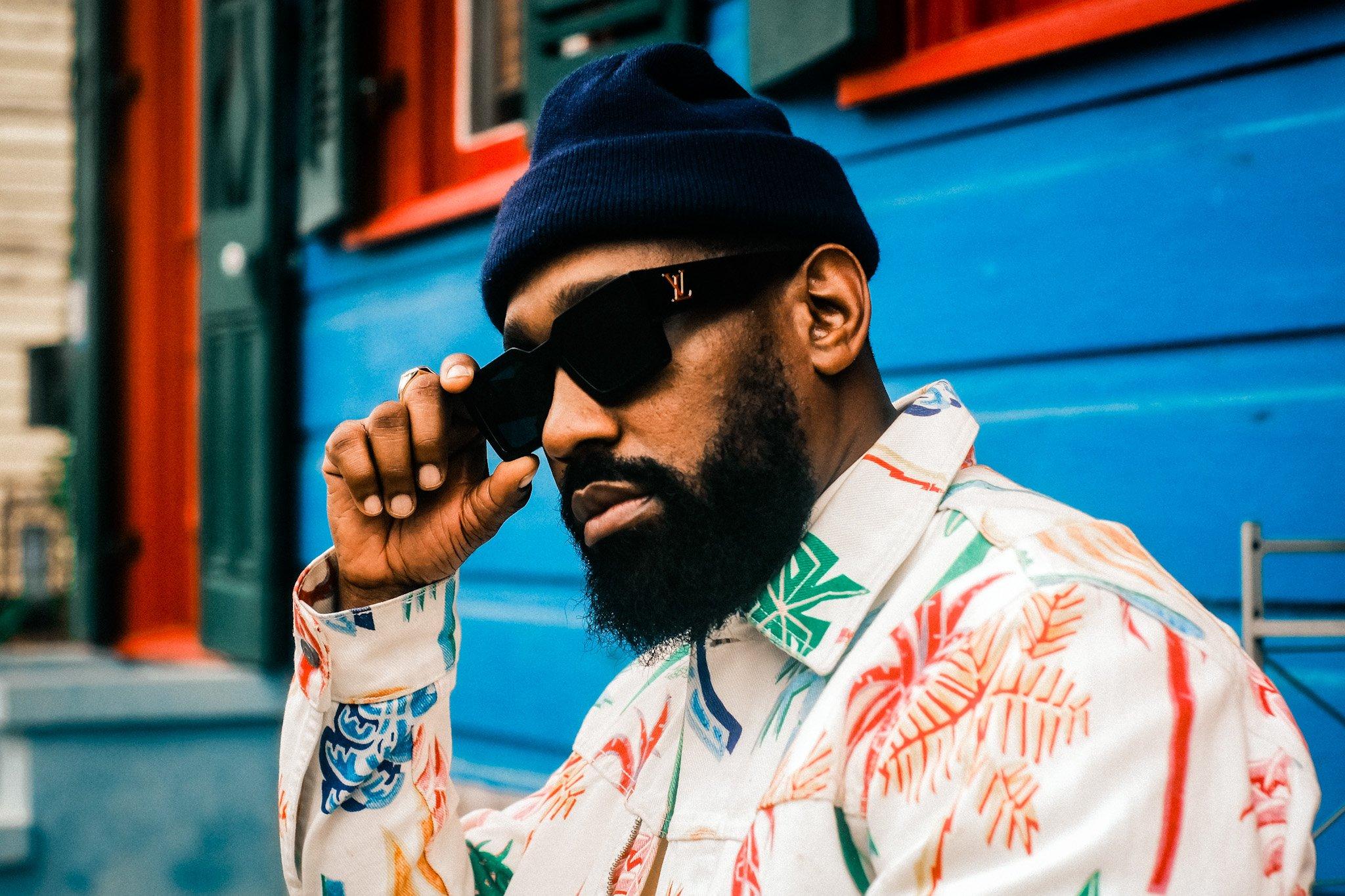
Photo: Patrick Melon
interview
On 'Cape Town To Cairo,' PJ Morton Connects New Orleans To The Motherland — One Day At A Time
Maroon 5 keyboardist PJ Morton details creating his new album in an intuitive and freewheeling manner while traveling up and down the African continent.
Maroon 5 keyboardist PJ Morton's guest-stuffed new album, Cape Town to Cairo, is built on an attention-grabbing conceit. He wrote and recorded it within a 30-day span, while journeying the African continent, visiting Johannesburg, Lagos, Accra, up to Cairo, back down to South Africa.
But a good story is just that, and the entire project — which features Fireboy DML, Mádé Kuti, the Soweto Spiritual Singers, and others — would collapse without quality songs. "The songs were the main thing," the five-time GRAMMY winner says. "It doesn't matter who I have on these songs if I don't have any good songs, so that was the priority."
It's a chicken-or-egg situation; the raw materials of Cape Town to Cairo are solid, but the guests helped them truly pop. Of Nigerian native Fireboy DML, who Morton worked with in his home country: "I had a bit of my song 'Count on Me' already, and he sat there and wrote that in 20 minutes," he says, with awe still palpable in his voice.
Elsewhere, Morton hails South African trumpeter and composer Ndabo Zulu's sense of instrumental space on "All the Dreamers" (which also features singer/songwriter Aṣa), and on the highlife "Who You Are," Mádé Kuti's channeling of his grandfather Fela Kuti's essence.
What was Morton's primary takeaway from the experience? Most of us abstractly understand how much Africa influenced American music; it's another ballgame altogether to witness it firsthand — as this native New Orleanian did.
"When I'm in Lagos, Nigeria, and I'm seeing the horn players play, I'm like, Man, this feels like home," Morton enthuses. "I'm in Ghana, and I hear highlife, I'm like, This feels like a second line or something. And then, I eat jollof rice, and I'm like, Man, this is jambalaya. This is their version."
Read on for the full interview about Cape Town to Cairo, and what Maroon 5's working on in 2024.
This interview has been edited for clarity.
When our CEO, Harvey Mason jr., traveled Africa, he called the experience "mind-bending," "game-changing" and "eye-opening." What was your reaction?
Oh, man. That was constantly happening for me over and over. When someone says, "Welcome home," or I look at money and see a Black man on the money, I'm like, Man. This is a different place, and so much love.
But for me, it was all the connections I was making to my home. I mean, being from New Orleans, a lot of the food, the music, the way they dance in the streets, and the way they celebrate, it just was really a bunch of connections happening for me. I'd say it was a life-changing trip for me.
I totally hear that syncopation and swing in Maroon 5.
Yeah. This is a big statement, but ultimately all our music is African music. It's hard to unsee once you see that. Now, all I see and hear is Africa a lot of times. We've used those three chords and the truth forever. These banjos, these things were created in Africa.
I've been in Maroon 14 years, and I think a reason I connected with the guys is because we're influenced by the same things — even in different worlds that we didn't realize were the same things.
Can you talk about the process of making Cape Town to Cairo while on the road?
That's what was so crazy about this — I created the album in 30 days while in Africa from scratch.
So, there was no time to process and then put it together, which was also just fascinating — something I never do. I take my time. I'm intricate. I cross every T and dot every I, so this was an experiment in trusting my instincts and just trusting what I know that has gotten me this far in music.
That was a really interesting part — because I had to quickly process what I was feeling, or not even fully process, but allow my soul and my body to process it and just write whatever was coming out, and create whatever music that was happening in South Africa.
Sounds like a heavy readjustment of your usual thinking.
As soon as I stepped on the ground and the first day we were in the studio, everybody was kind of on edge because they didn't know what I was going to write. I didn't know what I was going to write, but three songs came immediately.
Three ideas came that very first day I was in the studio, and that kind of relaxed me a bit, but that was the process. It was feel where you are, go in the studio, write some melodies, create some music, come back a few days later, put lyrics to that, and then redo.
And so, we did from South Africa, we started in Cape Town, obviously to Cairo, but with Cape Town. Then we went to Johannesburg, and all in between this, I was doing shows. We were doing concerts. I was doing radio interviews, TV interviews. I really wanted to just engulf myself as fast as I could.
When we got to Lagos, we landed on Fela Kuti's birthday, who's the father of Afrobeat. And man, it was so inspiring for me. I went in the studio the next day in Lagos, and the same thing happened — three songs just like that, three ideas.
One thing that was also different from my process is, sequencing is so important to me, but I couldn't leave Africa without knowing that these songs worked together. So I had to kind of work through that process in a truncated period of time, but I'm so proud of what happened. It's just really listening to my instincts, and it is raw emotion, this album is.
Some of the songs, I didn't realize what I was talking about until after I listened to them, and it was like, oh, I thought I was talking about this, but I'm talking about this.
Such as?
"Please Be Good to Me," specifically, it was like, I thought it was like a sexy love song, vibe song, but I feel like I'm talking to Africa.
Like, Take me to another place. I don't need to be in control. I've promised all these people I'm going to write an album in 30 days. Continent, please be good to me. Just give it to me. I have bad writer's block sometimes, so I was hoping that didn't happen, and it worked out.
Fela Kuti… speaking of people who should be on money. But what's his significance to you, personally?
I just think the way he was a fighter, the way he was a band leader, I really pride myself on musicianship.
Again, being from New Orleans — Afro Orleans is the name of my new band that we're going out with in the summer, and it's the horns, it's the percussion and all of that. So it is in that spirit of Fela. Also, his grandson, Mádé Kuti, is on one of the songs, "Who You Are."
He's the first person that made me pay attention to African music in general. My gateway was Fela. And so, to connect it this way, and to finally be in Lagos where he did it — to be at the shrine — was just special.
You made Cape Town to Cairo in such an intuitive and freewheeling manner. How did you ensure an album came out the other end, and not a bunch of outtakes or something?
It was trial and error, man, because initially I was trying to do so much stuff that I was like, Wait, I lost my voice. You know what I'm saying? I was just trying to do too much, and I was like, OK, let's kind of refocus and keep the main thing. So, I had to cancel some interviews; I had to cancel some things and really focus on the main things.
For me, it was trusting those ideas, the things that felt good. What happens in the studio with me is, sometimes I'll have a good idea, but I'm like, well, I can beat that. Let me try to beat it, and then I'll try to beat it. Sometimes, that first one was the one that was supposed to happen, but technically I'm beating it.
But am I beating it? I don't know, because maybe it wanted to come out in that pure form, and not have me get in the way with all my knowledge and years of [experience].
So I started to really trust that. I really just was like, OK, first idea, let's go. This first melody, that's what came out. Let's go with that. Then, I would write lyrics to my mumble track of the melody that I felt right, that moved me immediately. Thankfully, I've been writing songs for a long time, and we got to it, man.
But you're right — it wasn't just about writing songs in 30 days. It's about writing a complete album that I thought was good in 30 days, which is a completely different thing. But I just locked in, man, and I'm still kind of tripping that it happened this way, but I can literally place every song and remember where I was because it's such a short period of time.
I can't wait to fully see the footage of me creating from scratch. We're working on the documentary now, but I've never seen myself make something from nothing [like] this. So, I'm excited to see the inception to the full thing.
What's Maroon 5 up to?
We just did Questlove's podcast and talked about it a little bit, but we're definitely working on a record. Adam's been on fire writing lately, and we just finished the residency in Vegas days ago. We'll be back in Vegas in September, at Park MGM.
But it's going great, man. The music is coming out really cool. I joined at a unique time, which is after Hands All Over and before "Moves Like Jagger" and all of that stuff. It was a transition when Adam started to bring in co-work, and Hands All Over is the last time they didn't use co-writers.
So, now it's back to just him writing, and it's refreshing. I can't lie. It's exciting.
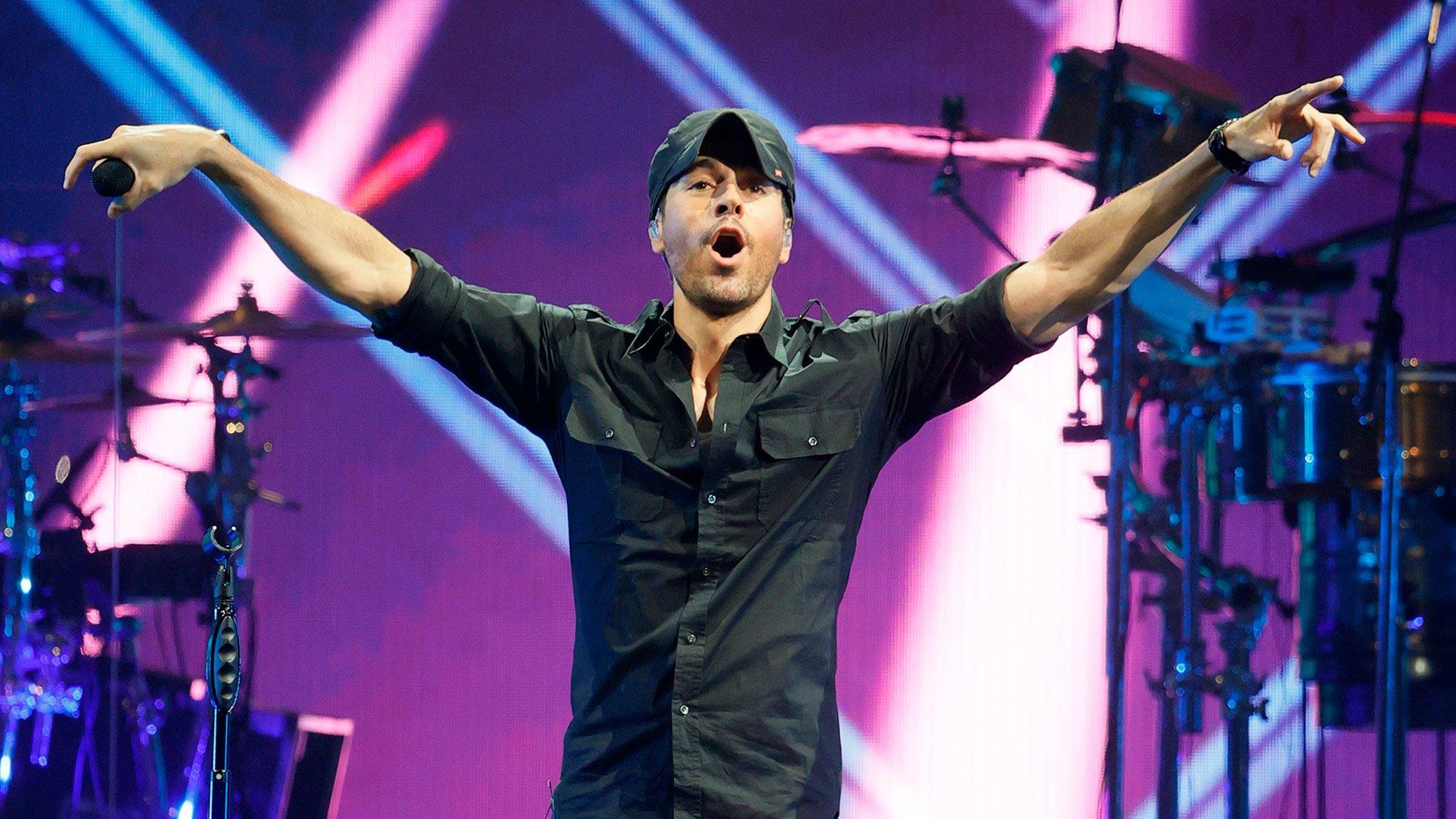
Photo: Ethan Miller/Getty Images
list
Enrique Iglesias Forever: 10 Songs That Prove He's A Latin Pop Hero
Ahead of what might be his final album — 'Final (Vol. 2),' out March 29 — celebrate Enrique Iglesias' legacy of groundbreaking Latin pop with 10 tracks of heartbreak, sensuality and dancefloor bangers.
Latin music has gone global and Enrique Iglesias is one of the superstars who laid the foundation for that crossover. The Spanish pop icon's music career spans four decades of hits both in his native tongue and in English. Following his reign as Billboard’s Greatest Latin Artist of All-Time, Iglesias marks the end of an era with the last album of his career, Final Vol. 2.
Iglesias followed in the footsteps of his father, singer/songwriter Julio Iglesias, and made his own debut in the 1990s with Spanish-language love songs. He began singing in English at the end of the decade, and subsequently led an explosion of interest in Latin pop alongside acts like Ricky Martin, Jennifer Lopez, and later Shakira.
As of writing, Iglesias has a record-breaking 27 No. 1 singles on Billboard's Hot Latin Songs chart, and solidified himself as a global heartthrob with an allure that defies language barriers. For his efforts, Iglesias has won one GRAMMY and five Latin GRAMMY Awards.
Enrique Iglesias will release what will likely be his final album on March 29, aptly titled Final (Vol. 2). Ahead of his final bow, here are 10 tracks that celebrate Iglesias' legacy in Latin music.
"Experiencia Religiosa" (1995)
Iglesias made his debut in 1995 with a self-titled first album. Among the ballads on the10-track LP, the otherworldly "Experiencia Religiosa" best demonstrates the power of his charm.
Backed by the piano with elements of gospel music, Iglesias belts his heart out about a night of passion that felt like spiritual awakening. To capture the energy of the sparks flying, an electric guitar solo rounded out his soulful yet sexy sermon. Iglesias demonstrated his knack for seamlessly blending together romance and sex appeal, which would go on to define his artistry and style.
Enrique Iglesias earned the singer his first golden gramophone at the 39th GRAMMY Awards for Best Latin Pop Performance.
"Nunca Te Olvidaré" (1997)
Iglesias proved that he was here to stay with his third album, 1997's Cosas Del Amor. The LP includes one of his signature love songs, "Nunca Te Olvidaré."
Iglesias' voice reached angelic highs in the Spanish-language power ballad, which details romance that left a lasting impression. No matter what happened, the love Iglesias shared with that person couldn't be forgotten — much like his impact on the Latin pop explosion that was brewing.
"Bailamos" (1999)
Proving he was so much bigger than the Iglesias last name, he crossed over into the English-language market with his 1999 album Enrique. Iglesias became a global Latin pop heartthrob with the sultry club banger "Bailamos." The song was featured on the Wild Wild West soundtrack, after Will Smith personally invited Iglesias to contribute music to the project.
Backed by the strum of the Spanish guitar with alluring synths, he invited the world to dance with him in English and Spanish. In a major moment for Latin acts at the time, the song topped the all-genre Billboard Hot 100 chart. The massive success of the song led Iglesias to sign with Interscope Records, where he released his breakthrough album.
"Could I Have This Kiss Forever" (1999)
One of the underrated gems on Iglesias' Enrique album is his collaboration with six-time GRAMMY-winner Whitney Houston.
The late pop legend joined forces with him for the sensual "Could I Have This Kiss Forever," making worlds collide with an irresistible mix of Latin percussion, Spanish guitar, and R&B. Houston also sang a bit in Spanish with Iglesias. His dreamy duet with Houston (who also sings in Spanish) broke down barriers for collaborations between Latin and English-language pop acts. In the years that followed, he collaborated with superstars like Kelis, Ciara, and Usher.
"Hero" (2001)
Iglesias' love songs in English touched the hearts of millions around the world. One of his enduring classics is the empowering "Hero" from his 2001 album Escape.
The beautiful ballad was released in both English and Spanish. In one of most tender vocal performances, Iglesias serenades his lover with sweet lyrics about always being by her side. After the song impressively peaked at No. 3 on Billboard's Hot 100 chart, Iglesias proved that his star power was here to stay.
The song also became an anthem of hope for the U.S. following the Sept. 11 attacks, and Iglesias was invited to perform "Hero" for the broadcast special "America: A Tribute to Heroes."
"Bailando" (2014)
After laying the foundation for the globalization of Latin music, Iglesias enjoyed one of his greatest career triumphs in 2014 — in both Spanish and English.
The feel-good smash "Bailando" blended Caribbean rhythms with flamenco influences, bringing together Sean Paul and Cuba's Descemer Bueno and Gente De Zona. The Spanglish banger peaked at No. 12 on the Billboard Hot 100 chart. At the 2014 Latin GRAMMYs, Iglesias and his collaborators took home golden gramophones for Song Of The Year, Best Urban Performance, and Best Urban Song.
The success of the song also helped usher in the reggaeton music revival of the last decade. Pop and reggaeton collaborations became more commonplace with songs like "Despacito" by Luis Fonsi and Daddy Yankee and J Balvin’s "Mi Gente" remix with Beyoncé later following suit.
"Beautiful" (2014)
Iglesias joined forces with GRAMMY-winning dance-pop icon Kylie Minogue for "Beautiful," a haunting love song about a formidable romance that could withstand the apocalypse.
The electronic ballad was co-produced by Mark Taylor, who was also at the helm of Iglesias' collaboration with Houston. Iglesias and Minogue's voices melted together in a hypnotic harmony that made this song live up to its name. The song was included on Minogue’s Kiss Me Once album and deluxe edition of Iglesias’ Sex and Love LP.
"El Baño" (2018)
Before he became a GRAMMY-winning global star, Puerto Rican singer Bad Bunny teamed up with Iglesias for a freaky reggaeton romp, "El Baño."
Iglesias first turned up the heat by singing about getting intimate with his lover in the restroom. Bad Bunny dropped in that halfway point as his wingman with a fiery guest verse. The hypnotic collaboration was included on Iglesias' penultimate album Final (Vol. 1).
Iglesias later added a woman’s perspective to the song, bringing on Dominican reggaeton star Natti Natasha joining them on the remix. As one of Latin pop’s most daring artists, he was never afraid to push boundaries with his risque tracks.
"Space In My Heart" (2024)
After the release of his reggaeton-heavy Final (Vol. 1), Iglesias was ready to be more adventurous with the music that followed. In 2022, Iglesias ventured into country music for the first time with "Espacio En Tu Corazón."
To bring some more authenticity to the English-language version of the song, "Space In My Heart," Iglesias teamed up with GRAMMY-winning country star Miranda Lambert. The breathtaking country-pop ballad features Iglesias and Lambert singing passionately about winning over the hearts of their crushes.
The song is a highlight on the last album of his career, Final (Vol. 2). And while it seems like this may be the singer's final hurrah, Iglesias told PEOPLE in 2021: "No, I'm never gonna retire! I'm gonna keep on writing songs but that doesn't mean I need to be putting out albums every so often."
"Fría" (2024)
Iglesias is going out in style with "Fría." For the most vibrant song on Final Vol. 2, Iglesias collaborates with Cuban singer/songwriter Yotuel on a frisky and refreshing banger, which blends reggaeton beats with elements of tropical music.
Iglesias sounds like he's having a blast with Yotuel as they try to convince their partners there was no infidelity at last night's wild party. "I just went out for a cold one," Iglesias winkingly sings in Spanish. Cheers to the legacy of one of Latin pop's greater stars.
10 Women Artists Leading A Latin Pop Revolution: Kenia Os, Belinda & More
